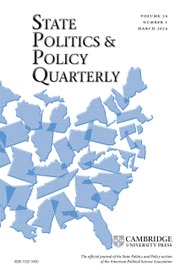Article contents
How Politics Shapes State Identities in the US
Published online by Cambridge University Press: 30 October 2024
Abstract
The increasing nationalization of state and local politics alongside polarization and gridlock at the federal level have led states to become sites where policymaking on national hot button issues occurs. This political climate calls for a reconsideration of existing accounts of state identities, which posit that state identities are generally weak and apolitical in their content. This study considers the following questions: To what extent do respondents identify with their state? How does their state identity compare with other politically salient groups, like national identity, partisanship, race, and gender? To what extent and under what conditions are political considerations associated with state identities? How do results compare across different measures of state identification? Results show that a majority of respondents say that being from their state is an important part of their identity and the proportion saying so is similar to the proportion saying their race, class, and political party are important. Although politics may not come to mind first when respondents consider why their state is important, it relates to general feelings of connectedness, particularly for people in the political majority in their state, and being in the political majority is associated with increased levels of state identification. Results are similar across different measures of state identity. Closed- and open-ended questions show politics emerges most clearly when people explain why their state is not important to their identity. I discuss the implications of these findings and offer thoughts for future research.
- Type
- Original Article
- Information
- Copyright
- © The Author(s), 2024. Published by Cambridge University Press on behalf of the State Politics and Policy Section of The American Political Science Association
References
- 1
- Cited by


